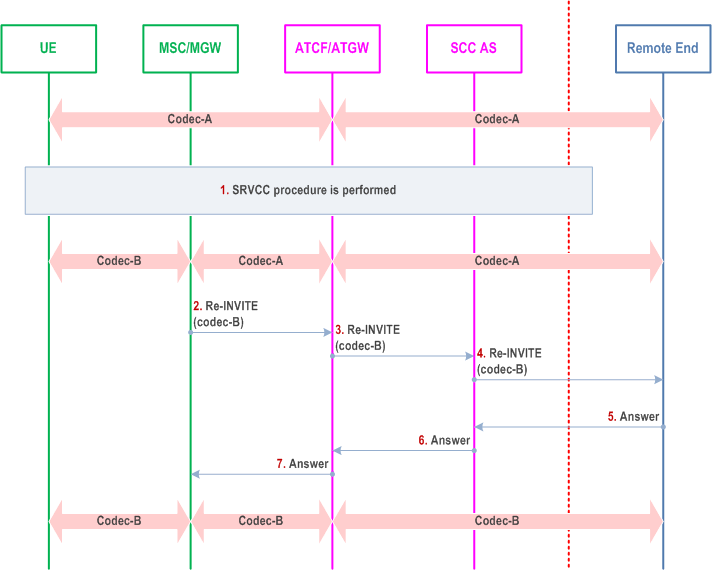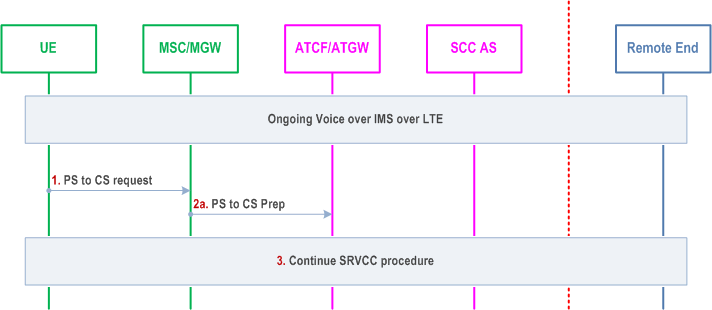Content for TS 23.237 Word version: 18.0.0
0…
4…
5…
5.4…
6…
6.2…
6.2.2…
6.3…
6.3.2…
6.3.2.1.3…
6.3.2.1.7…
6.3.2.1.9…
6.3.2.2…
6.3.2.3…
6.3.2.3.6…
6.3.3…
6.4…
6a…
6a.3…
6a.4…
6a.4.3…
6a.4.5…
6a.4.7…
6a.4a…
6a.5…
6a.6…
6a.7…
6a.8…
6a.9…
6a.10…
6a.11…
6c…
7…
A…
B…
C…
B Additional enhancements for SRVCC
B.1 General
B.2 Minimize the transcoding for SRVCC
B.2.1 Codec re-negotiation after session transfer (SRVCC)
B.2.2 Codec inquiry prior to session transfer (SRVCC)
B.3 Reject SRVCC due to UE call state incompatibility
B (Normative) Additional enhancements for SRVCC |R14| p. 182
B.1 General p. 182
This Annex describes optional procedure that MSC server may perform to enhance SRVCC. Clauses B.2.1 and B.2.2 describes procedure to minimize the transcoding points for SRVCC. In clause B.2.1, the procedure is triggered after performing SRVCC, while in clause B.2.2; it is triggered prior to performing SRVCC. For minimizing transcoding feature, if enabled, at least one of these options shall be supported and deployed by MSC server and IMS within one network. Clause B.3 describes the procedure to enables the MSC server to reject SRVCC due to UE call state incompatibility.
B.2 Minimize the transcoding for SRVCC p. 182
B.2.1 Codec re-negotiation after session transfer (SRVCC) p. 182
After SRVCC has been successfully performed (see clauses 6.3.2.1.9.1 and 6.3.2.1.9.2), MSC Sever may initiates a SIP REINVITE to modify the Selected Codec towards the remote end in order to minimize the transcoding points in the voice path.
Figure B.2.1-1 below illustrates this procedure with the assumption that the remote end supports the selected target RAN codec (B) in the Re-INVITE.

Step 1.
SRVCC is performed. MSC Server has included all supported codecs into the session transfer request to the ATCF. In this flow the codec list may include the codec that is currently used in the ongoing IMS session and ATCF has selected this codec, therefore there is no transcoding in ATGW but there may be transcoding in CS-MGW. The session between UE and CS-MGW uses the codec-B. The session between CS-MGW, ATGW and remote end uses the codec-A.
Step 2.
The MSC server sends a Re-INVITE to remote end with list of supported codecs in MSC server to ATCF, codec B is the most preferred codec in the list.
Step 3.
ATCF passes the Re-INVITE towards the SCC AS with the codec list.
Step 4.
SCC AS performs a remote leg update towards the remote end.
Step 5-7.
The remote end accepts the offer and selects the most preferred codec it can support, in this case codec B was selected. From now on the codec B is used e2e in TrFO manner.
B.2.2 Codec inquiry prior to session transfer (SRVCC) p. 183
B.2.2.1 Procedure for codec inquiry prior to session transfer p. 183
During SRVCC with ATCF procedure and prior to the session transfer and CS radio reservation procedure, MSC Server request from ATCF for the codec choice to be used for CS Codec on the target RAN.
Figure B.2.2.1-1 below illustrates this procedure.

Step 1.
During the Session Transfer procedure, ATCF takes the MSC Preferred Codec List (indicated by MSC Server in the Initiation of Session Transfer as defined in TS 23.216) into account to determine the optimal Codec for the MSC-IMS interface. The downlink flow of VoIP packets is switched towards the CS access leg at this point. The ATCF responds to the Initiation of Session Transfer with the chosen Codec for the MSC-IMS interface back to the MSC Server.
PS-CS handover procedure is triggered from MME with SRVCC PS to CS Request (see TS 23.216).
Step 2a.
MSC Server, optionally prior to executing the normal SRVCC procedure as defined in TS 23.216, MSC Sever sends a PS-to-CS-Preparation-Request message (STN-SR, C-MSISDN, and MSC Supported Codec List) to the ATCF. The call-specific MSC Supported Codec List contains all Codecs (Codec Types plus Codec Configurations) that are supported and offered commonly by the UE, the target RAN and the target MGW.
Step 2b.
The ATCF compares the IMS Selected Codec with the Codecs of the MSC Supported Codec List and generates the call-specific IMS Preferred Codec List for the PS-to-CS-Preparation-Response message. The Payload Type Number of the IMS Selected Codec (Codec Type plus Codec Configuration) is included.
Step 3.
MSC Server takes the information of the PS-to-CS-Preparation-Response message into account when continuing the SRVCC procedure.
B.3 Reject SRVCC due to UE call state incompatibility p. 184
Additional enhancement may be applied to avoid unsuccessful SRVCC. If supported, this procedure enables the MSC server to decide whether to proceed or not proceed with SRVCC.
In order to enable the MSC server to decide whether to proceed with SRVCC or not for the current session, IMS needs to indicate to the MSC server if IMS supports SRVCC in pre-Alerting or Alerting state and the actual state of the call. If SRVCC at this stage of the call is not possible (e.g. due to the call being in Pre-Alerting or Alerting), then the MSC server shall not proceed with SRVCC.